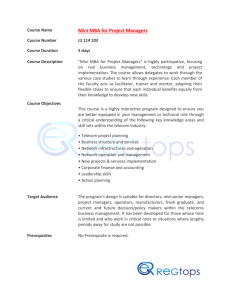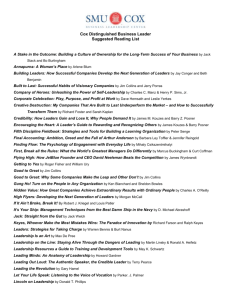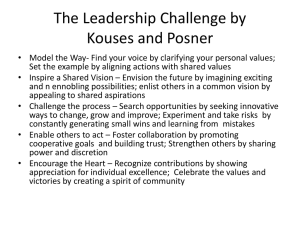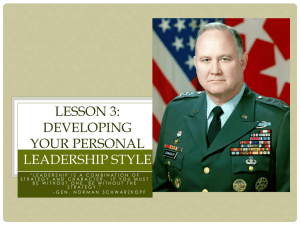the PowerPoint
advertisement
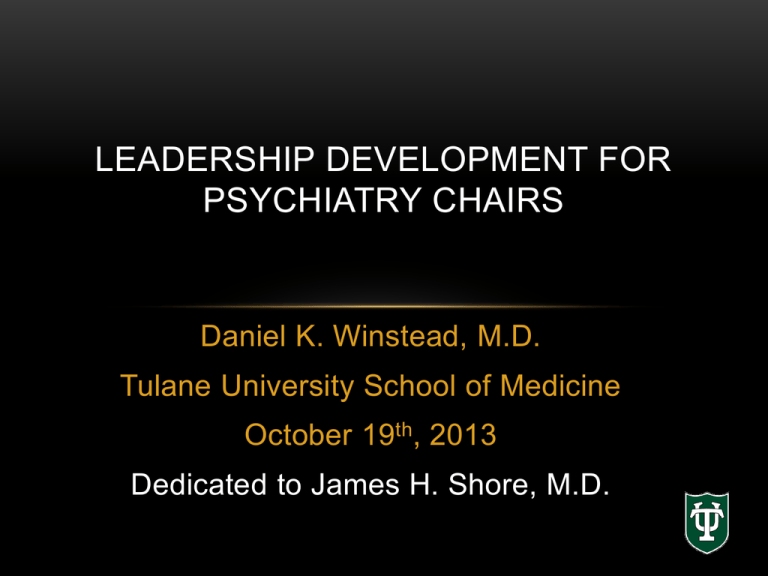
LEADERSHIP DEVELOPMENT FOR PSYCHIATRY CHAIRS Daniel K. Winstead, M.D. Tulane University School of Medicine October 19th, 2013 Dedicated to James H. Shore, M.D. DISCLOSURE OF FINANCIAL RELATIONSHIPS DR. DANIEL K. WINSTEAD Has no relationships with any entity producing, marketing, re-selling, or distribution health care goods or services consumed by, or used on patients. How is Leadership defined? Do you know it when you see it? “Leadership is the art of getting someone else to do something you want done because he wants to do it.” Dwight D. Eisenhower “Management is doing things right; leadership is doing the right things.” Peter Drucker “Leadership is practiced not so much in words as in attitude and in actions.” Harold S. Geneen “Leadership is the capacity to translate vision into reality.” Warren G. Bennis “Leadership is an opportunity to serve. It is not a trumpet call to self-importance.” J. Donald Walters “The growth and development of people is the highest calling of leadership.” Harvey S. Firestone Are Leaders autocratic? Are Leaders democratic? When should Leaders be autocratic? When should Leaders be democratic? Participatory Management vs. Crisis Management I. Few “natural born” leaders II. Various pathways to leadership positions A. Mentorship 1. Key route B. Course work, seminars, etc. Professional meetings and associations, e.g. Association of Physician Executives.) C. Formal degrees (MBA, Executive MBA, MPH, MHA, etc.) D. Networking E. Create liaison activities with other national organizations F. Use conflict resolution to build your reputation as a “peacemaker” 1. Search for “common ground” 2. Help people stay within priorities of the organization “Success is not final, failure is not fatal: it is the courage to continue that counts” Winston Churchill “Failure is the condiment that gives success its flavor” Truman Capote “Do not follow the ideas of others, but learn to listen to the voice within yourself. Your body and mind will become clear and you will realize the unity of all things” Dogen III. Key ingredients of leadership (from Dr. Ronald M. Davis, American Medical News, February 18, 2008.) 1. Filling the vacuum 2. Pursuing noble causes 3. Recruiting a good team 4. Inspiring the team and the masses 5. Being bold III. Key ingredients of leadership (cont’d.) 7. Taking risks 8. Aiming high and pushing the envelope 9. Challenging the odds 10.Rolling up their sleeves 11.Leading the way in times of crisis Time Management 1. Select committees for impact and time sensitivity 2. Just say “no” (carefully) or negotiate Fostering Professional Development 1. Mentors 2. Good bosses 3. Advantageous academic environment 4. Support autonomy yet structure 5. Opportunities for growth and new challenges/positions Take Courses 1. Organizational Behavioral 2. Hospital Management 3. Leadership A. Warren Bennis B. Stephen Covey C. Others (?) 4. The finances of medicine, GME, etc. Keep Your Options Open 1. Other universities 2. Other settings A. Academic Medical Center B. HMO C. Private Practice “We must combine the toughness of the serpent with the softness of the dove, a tough mind and a tender heart” Martin Luther King, Jr.
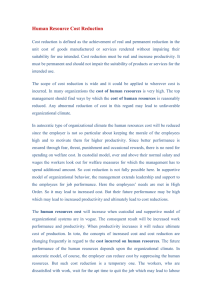
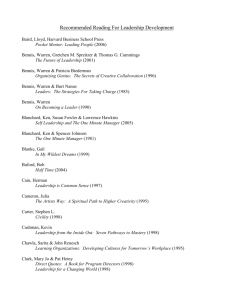

![11c BLfH Some Useful Thoughts on Leaders[...]](http://s2.studylib.net/store/data/010069944_1-83f694ddb7a37be5f4e285067be1e1fe-300x300.png)
